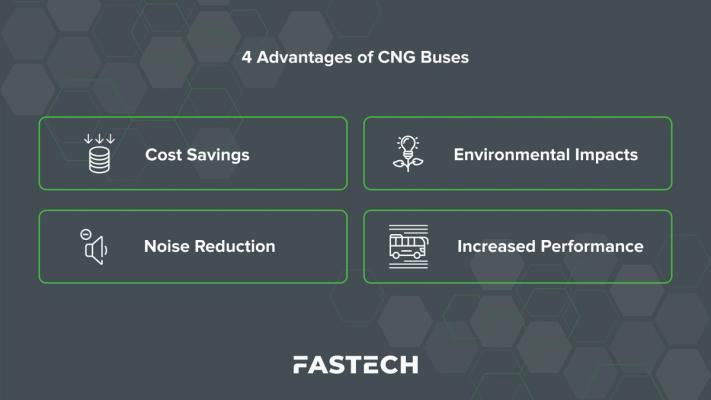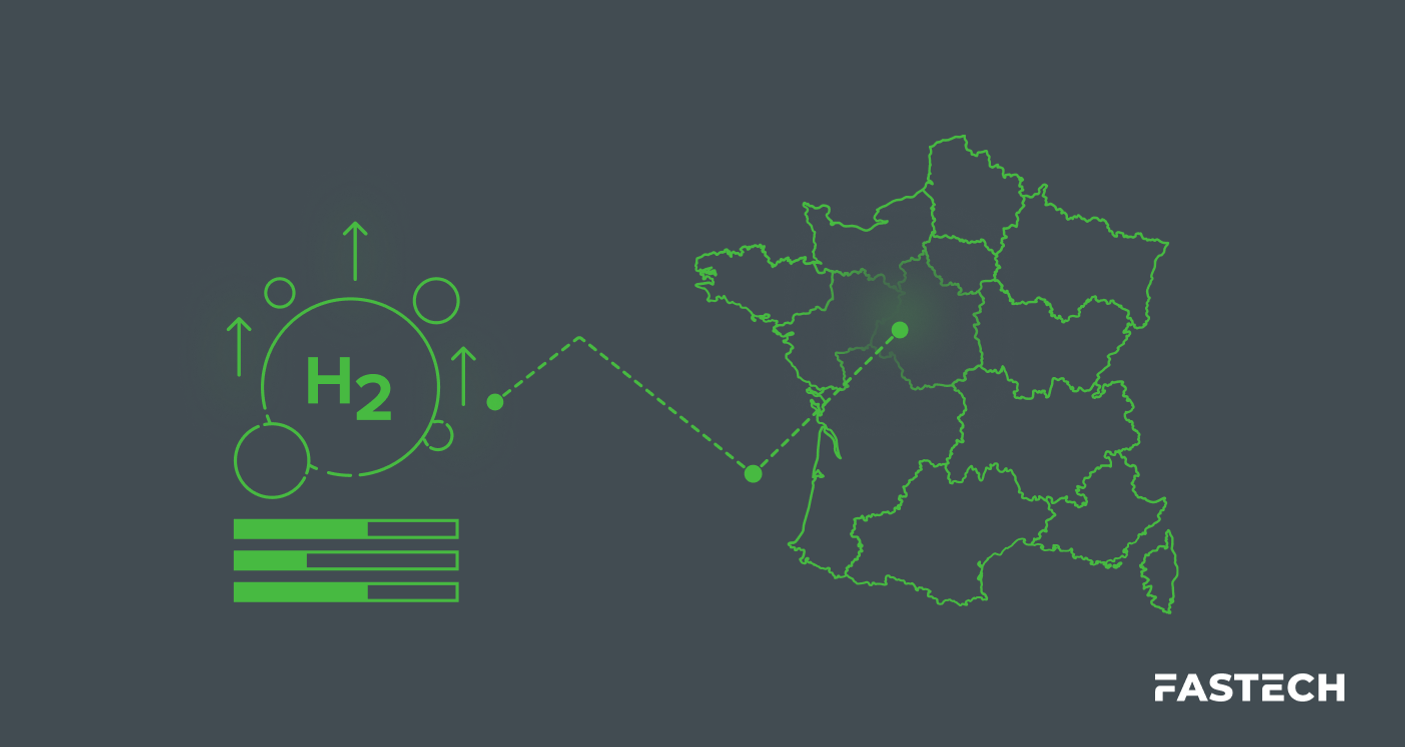CNG Buses Explained: How They Work and Their Advantages

Combating climate change requires innovation from city authorities, and public transportation is no exception. One way to achieve greener and more efficient mass transportation is to use eco-friendly alternatives like compressed natural gas (CNG) buses, which are already revolutionizing public transit.
The U.S. government has introduced many climate-positive transportation measures, increasing the likelihood that CNG buses could be key to lowering emissions, reducing transit’s carbon footprint, and decreasing reliance on nonrenewable fossil fuels.
But what exactly is CNG? How do CNG buses work? And how are they any more environmentally friendly than their diesel counterparts? Let’s take a look under the hood, uncover the key benefits, and answer some common questions.
What Is Compressed Natural Gas?
CNG is a fuel source used for powering vehicles and mobility equipment, including buses. Mostly methane (CH4), the majority of natural gas is sourced from deep wells that tap into underground deposits—making conventional CNG a fossil fuel.
However, biogas is a renewable alternative that’s growing in popularity. Biogas is produced naturally during the decomposition of organic material—anything from crops to manure to waste sludge can be feedstock for biogas.
Raw biogas is useful for some purposes but must be refined into biomethane—or renewable natural gas (RNG)—to fuel vehicles. Biomethane and biodiesel have fewer contaminants than their fossil fuel counterparts, allowing them to burn cleaner and quieter than traditional natural gas (more on that later).
Fuel manufacturers create CNG by pressurizing natural gas into specialized containers. As a result, CNG takes up less than 1% of the volume of its original form. But why compress natural gas in the first place?
Natural gas, in its raw form, doesn’t have the energy output necessary for vehicle fueling. To mirror gasoline or diesel performance, vehicles need a significantly higher volume of natural gas compared to liquid fuel. Since compressing the gas doesn’t change its chemical composition, pressurizing it solves the volume problem, enabling natural gas-powered buses and other equipment.
How CNG Buses Work
While CNG buses require some process and equipment adaptations, the long-term advantages can pay for themselves. There are four key factors needed to implement CNG bus transport solutions:
- Manufacturers build buses specially to run on CNG. While diesel and CNG buses appear similar, their fuel storage and interior fueling systems are significantly different. Though both still use an internal combustion engine, liquid and gaseous fuel injection require fundamentally different equipment. That said, this doesn’t stop some vehicles from using both fuel types. The two types of buses perform similarly on the road in both fuel efficiency and functionality.
- Compression devices are installed on natural gas lines at fuel stations. Natural gas enters a compressor station through integrated piping. After passing through scrubbers and filters to extract any liquids and remove solids or other particulate matter that could pollute the gas stream, the natural gas is clean and ready for compression.
- Natural gas is compressed so it can be used as fuel. As natural gas is compressed, heat is generated and must be dissipated to cool the gas stream before it can be dispensed.
- CNG buses are connected to hoses and refueled. According to the U.S. Department of Energy (DOE), “The time it takes to fuel a bus depends on the number of vehicles, compressor size, and the amount of buffer storage.” The department’s alternative fuel data center (AFDC) estimates the refueling time per bus at four to five minutes.
4 Advantages of CNG Buses
Let’s explore four significant benefits of integrating CNG buses into the transportation infrastructure.

1. Cost Savings
CNG is markedly cheaper than diesel fuel. The most recent data from the AFDC reports the national average price of diesel at $3.64/gallon. In comparison, biodiesel B20 ($3.53/gallon) and CNG ($2.91/GGE—gasoline gallon equivalent) are both cheaper.
Cheaper fuel effectively reduces the ongoing operational expenses of CNG vehicles compared to their diesel counterparts.
Although CNG vehicles come at a higher upfront cost than their diesel counterparts, experts contend that the investment pays for itself over the vehicle’s lifespan.
2. Environmental Impacts
There are two main byproducts of CNG combustion: Carbon dioxide (CO2) and water vapor (H2O). Thinking in terms of equations, Methane + Oxygen (O2) → Carbon dioxide (CO2) + Water (H2O).
Incomplete combustion also emits carbon monoxide (CO) and unburned hydrocarbons (UHC) but in much smaller quantities than burning diesel or gasoline (even after factoring in impurities in the fuel). Nitrogen, both atmospheric and via fuel impurity, also causes harmful oxides to be emitted but, again, at much lower levels than diesel.
In diesel combustion, forty-eight parts of carbon dioxide are released for every four parts of fuel burned. However, only four parts of carbon dioxide are emitted for every four parts of CNG combusted—a significantly lower emissions profile.
3. Noise Reduction
Many regions regulate noise pollution, and some have strict emissions standards (see California’s LCFS—Low Carbon Fuel Standard). In addition, the United States Environmental Protection Agency (EPA) sets limits on noise sources, including construction equipment, transport vehicles, trains, and more.
CNG engines are up to ten decibels quieter than comparable diesel engines. Municipalities can simultaneously bolster their compliance and improve the quality of life for riders and local residents alike with CNG buses.
4. Increased Performance
All in all, CNG performs better than diesel fuel in three ways.
- Particulate matter emissions: While diesel engines emit visible and detectable particulate matter (PM) as black soot, CNG engines emit next to none.
- Collision safety: CNG fuel tanks are safer and more robust than diesel tanks. Since CNG is stored in vehicles at high pressures, fuel tanks are sturdily designed, preventing explosions in the event of crashes involving CNG-powered buses. Additionally, safety features like on-board detectors ensure leaks don’t go unnoticed.
- Vapor safety: CNG vapors are odorless, colorless, and non-toxic. By contrast, diesel and gasoline vapors are quite toxic to ingest or breathe. Like other fuels, CNG emissions have the potential to build up in enclosed spaces and can lead to asphyxiation. However, the risk of fuel inhalation is a significantly lower concern for CNG vehicles.
Read more: CNG vs. LNG vs. Propane
Frequently Asked Questions About CNG Buses
Will advanced admissions control systems make CNG unnecessary?
Diesel emissions from buses have improved significantly over the last decade. Most of the improvements have resulted from enhanced engine design. In the future, diesel engines will likely need to depend on emission control devices to reduce emissions further.
The issue: The durability of emission control devices on diesel and diesel-hybrid buses depends on fuel quality. If the devices degrade over time because of lower-grade fuel, emissions could be much higher, on par with those of the aging gasoline buses on the road today.
In addition, diesel buses emit toxins, including benzene, and 1, 3-butadiene, that buses fueled with CNG do not. Based on this information, CNG buses will likely always have emissions advantages over diesel buses because natural gas combustion is inherently lower-emission.
Will ultra-low sulfur diesel fuel and diesel-hybrid buses negate the benefits of CNG buses?
Testing hybrid buses that use advanced emission control technologies coupled with ultra-low sulfur diesel fuel has resulted in particulate matter emission levels similar to those of natural gas engines, requiring minimal exhaust emission control.
However, nitrogen oxide emissions from these experimental buses were higher than those from condensed natural gas buses. In addition, the special diesel fuel needed for the emission control systems to work correctly on these engines will not be commercially available for at least five years, and it is expected to cost more than conventional diesel fuel.
On top of this, natural gas emission control devices will most likely be less expensive and more durable than those for diesel engines. That’s because there are far fewer nitrous oxide and particulate matter emissions with natural gas to degrade the devices.
Are fuel tanks in CNG buses more likely to explode?
The technology behind CNG bus fuel tanks has been around for a long time. CNG fuel tanks are actually stronger and safer than traditional diesel or gasoline tanks, showing better durability in collisions.
Are CNG buses safer than other options?
Compressed natural gas buses come with different safety concerns than diesel fuel buses. However, no data shows buses fueled by compressed natural gas have a greater risk of fire or explosion than diesel buses. CNG buses are equipped with gas detectors and other equipment to ensure safety.
Are natural gas buses more difficult to maintain?
Mechanics must have the skills necessary to maintain different types of buses. They have to understand the properties of the fuels used in them. This situation is similar to how diesel mechanics get different training than those working on gasoline vehicles.
In short, maintaining CNG buses requires special training, tools, and test equipment—but nothing outside of what’s required for other vehicle types.
Are CNG bus facilities and fueling stations hazardous?
There’s no evidence that CNG bus maintenance facilities are less safe than traditional ones. Natural gas and diesel fuels are both flammable and require safety and fire protection equipment.
Additionally, diesel bus facilities typically store much larger quantities of fuel on-site than CNG facilities, putting them at greater risk. Ground soil contamination from diesel tank leaks is another issue that CNG facilities do not face.
Are CNG buses better than diesel?
CNG buses provide four key advantages that traditional ones do not. Buses powered by compressed natural gas are more cost-effective, environmentally sound, less noisy, and perform better, meaning they emit fewer particles, are safer, and release fewer vapors that are less harmful.
Choose FASTECH for Your Renewable Energy Fueling Projects
CNG buses are an environmentally and operationally friendly option—outperforming diesel and gasoline engines in emissions profiles, price, and safety.
Is your business prepared to embrace a net-zero future as alternative fuel continues expanding?
If you’re ready to champion a cleaner energy system, turn to the experts at FASTECH. We engineer and build end-to-end renewable energy solutions, helping green companies exceed their sustainability goals affordably. Let’s usher you into the next generation of energy—explore your CNG energy options today.




